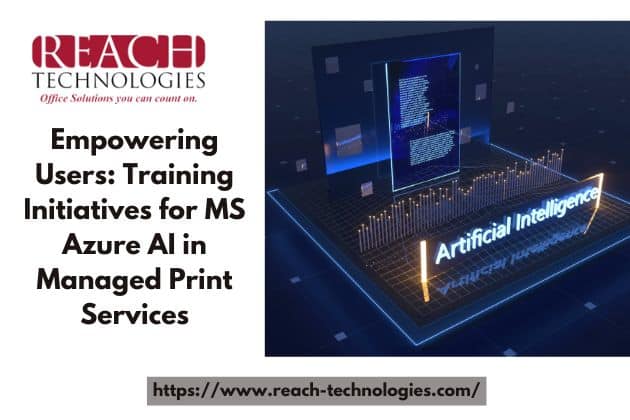The convergence of Artificial Intelligence (AI) and Managed Print Services (MPS) is revolutionizing the printing landscape. Microsoft Azure, a leading cloud computing platform, offers a robust suite of AI tools that can optimize and streamline print operations. However, unlocking the full potential of this powerful technology requires a skilled workforce.
This blog post explores the importance of training initiatives for empowering users with MS Azure AI in the MPS domain. We’ll delve into the benefits of AI-powered MPS, analyze key training areas, and explore diverse training methods to ensure successful adoption within your organization.
The Rise of AI in Managed Print Services: A Transformative Force
Traditional MPS primarily focused on managing printing infrastructure and consumables. However, MS Azure AI introduces a new paradigm, transforming MPS into a data-driven, intelligent service. Here’s a glimpse into how AI is reshaping the MPS landscape:
- Predictive Maintenance: AI algorithms analyze historical data to predict equipment failures and proactively schedule maintenance, preventing downtime and minimizing repair costs.
- Optimized Printing Workflow: AI can analyze user behavior and printing patterns to suggest more efficient workflows. This can involve automatic duplex printing, toner-saving modes, and personalized printing rules to reduce waste.
- Enhanced Security: AI-powered security features can detect and prevent unauthorized printing activities, safeguarding sensitive information.
- Cost Reduction: By optimizing printing processes and reducing waste, AI can significantly lower overall printing costs for organizations.
The Training Imperative: Equipping Users for Success
While AI promises significant benefits, its successful implementation hinges on user adoption and understanding. Here’s why training initiatives are crucial:
- Bridging the Knowledge Gap: Many users might not be familiar with AI concepts or their application in MPS. Training bridges this gap, empowering users to leverage the new functionalities effectively.
- Maximizing ROI: Proper training ensures users understand how AI-powered MPS features can benefit their workflow, leading to improved efficiency and cost savings.
- User Confidence and Acceptance: Training fosters confidence and encourages user acceptance of the new technology. This is vital for seamless integration of AI into daily operations.
Key Training Areas: Equipping Users with the Right Skills
Effective training for MS Azure AI in MPS should encompass several key areas:
- Fundamentals of AI in MPS: Introduce users to core AI concepts and their application within the MPS domain. This includes explaining predictive maintenance, workflow optimization, and security features.
- Utilizing AI-powered MPS Tools: Train users on how to leverage specific AI functionalities within the MPS platform. This can involve demonstrating how to access reports generated by AI analysis, interpret data visualizations, and interact with AI-powered recommendations.
- Data Security and Privacy: Educate users on data security practices within the AI-powered MPS system. This includes proper data handling procedures and user access controls.
- Understanding User Impact: Explain how AI-powered MPS can impact individuals’ workflows, emphasizing the potential benefits and encouraging user buy-in.
Crafting Effective Training Programs: Diverse Methods for Different Needs
There’s no one-size-fits-all approach to training. Here are various methods to consider:
- Interactive Workshops: Hands-on workshops provide a collaborative environment for users to learn by doing. This can involve interactive demonstrations, group exercises, and practice sessions using the AI-powered MPS tools.
- E-Learning Modules: Online modules offer a convenient and flexible way for users to learn at their own pace. These modules can incorporate video tutorials, interactive quizzes, and downloadable resources.
- On-the-Job Training: Providing dedicated support during initial use of the AI-powered MPS system can be highly beneficial. This allows users to ask questions and receive guidance in a real-world context.
- User Guides and Documentation: Comprehensive user guides and documentation serve as a valuable reference point for users with specific questions or troubleshooting needs.
Building a Culture of Continuous Learning: Fostering Long-Term Success
The training journey doesn’t end after the initial rollout. Here are some strategies to foster a culture of continuous learning:
- Knowledge-Sharing Sessions: Encourage knowledge sharing among users through regular sessions where experienced users can share best practices and tips learned from using AI-powered MPS.
- Ongoing Support: Provide ongoing support channels for users to address questions or technical issues. This could involve a dedicated help desk, online forums, or internal knowledge base resources.
- Staying Up-to-Date: As AI technology evolves, offer supplementary training sessions to keep users informed about new features and functionalities within the MS Azure AI platform.
Conclusion:
By implementing effective training initiatives, organizations can empower users to leverage the full potential of MS Azure AI in MPS. A well-trained workforce can confidently navigate the AI-powered MPS platform, optimize workflows, and unlock the promised benefits of efficiency, cost savings, and enhanced security.
This shift towards an AI-driven future necessitates a commitment to continuous learning. Embracing a culture of knowledge sharing, ongoing support, and adaptation to evolving technologies will ensure that users remain empowered and the organization reaps the long-term rewards of a truly intelligent MPS system. As AI continues to revolutionize the printing landscape, organizations that prioritize user training will be best positioned to navigate this transformative journey and unlock a new era of intelligent printing solutions.

